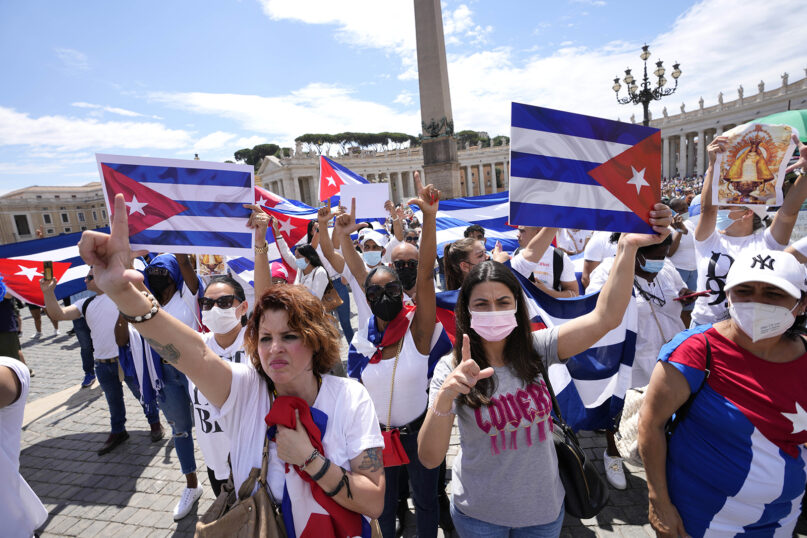VATICAN CITY (RNS) — When St. John Paul II landed in Cuba in January 1998, he became the first pontiff to visit the country, where he shared his hope for peace and freedom among its Catholic faithful.
“May Cuba, with all its magnificent potential, open itself up to the world, and may the world open itself up to Cuba,” John Paul said in a now famous statement issued upon his arrival.
Today, Cuba remains at the heart of the Holy See’s international efforts for reconciliation as Pope Francis renews appeals for dialogue and peace in a country overrun by political and social unrest.
During his first public address after leaving the Roman hospital where he underwent colon surgery, Francis spoke to the people of Cuba who were eagerly waiting for the pontiff to make a pronouncement on the large-scale protests rocking the Caribbean nation.
“I am near to the dear Cuban people in these difficult moments, in particular to those families suffering the most. I pray that the Lord might help the nation build a society that is more just and more fraternal through peace, dialogue and solidarity,” Francis said on Sunday (July 18) amid the loud cheers of expats proudly waving their Cuban flags in St. Peter’s Square.
RELATED: 2 weeks post-surgery, Pope Francis appears at Vatican window
His words took place one week after thousands of Cubans, mostly young people, took to the streets across the country to protest the regime led by President Miguel Diaz-Canel, successor to Raul Castro. The protesters condemned the rampant poverty rates, electricity shortages and the negative effects from the COVID-19 pandemic.

Cuban President Raul Castro, right, smiles as he meets Pope Francis during a private audience at the Vatican, May 10, 2015. (Pool photo via AP/Gregorio Borgia)
The Cuban government sent police forces to repress the protesters, making hundreds of arrests and cutting mobile services and internet access to its citizens. Diaz-Canel also led counterprotests, during which he blamed the United States for its role in “destroying the sacred unity and tranquility of the citizens.”
As unrest takes over numerous countries in Latin America — from Colombia to Nicaragua and now Cuba — the Catholic Church has tried to use its social influence to promote peaceful dialogue among faithful while supporting freedom of speech.
In a statement on July 12, the Cuban bishops recognized “the people have the right to express their needs, desires and hopes” and to publicly address how the measures undertaken by the government have negatively affected their lives, but also warned that “violence breeds violence” and encouraged citizens to seek dialogue and solutions that don’t fuel acrimony.
The call for amicable, nonviolent solutions was echoed by Archbishop Dionisio Garcia of Santiago, who encouraged faithful to rely on “dialogue, mercy and forgiveness, and never with violence and intolerance,” during his Sunday Mass at the National Shrine of the Virgen de la Caridad del Cobre, the patroness of Cuba.
Pope Francis also entrusted his prayers to the Virgin of Charity in his Angelus address. In 2015 , following in the footsteps of his predecessors, the Argentinian pontiff visited Cuba in what is considered a highlight of Francis’ foreign trips.
He also scored a win for Vatican diplomacy by arranging the meeting in Havana between then-U.S. President Barack Obama and Raúl Castro in 2016, which strengthened the recently restored diplomatic relations between the two countries.
After Francis’ visit, Cuba lifted some restrictions against religious freedom in the country, allowing its roughly 6 million Catholics to attend Mass. But the local church remains under strict government control and limitations.
As tensions rise in Cuba and grudges resurface against the U.S., the Catholic Church is once again attempting mediation. “We urge the United States to seek the peace that comes from reconciliation and concord between our countries,” read a July 19 statement signed by the president of the United States Conference of Catholic Bishops, Archbishop José H. Gomez of Los Angeles.
Together with the Holy See and bishops in Cuba, the episcopacy in the U.S. also “called for robust cultural and commercial engagement between the United States and Cuba as the means to assist the island in achieving greater prosperity and social transformation.”
The U.S. bishops and Pope Francis have often spoken out against the economic embargo that has strangled the Cuban economy for decades.
ALSO READ: Will those suffering late-stage dementia be the next to be called less than human?





